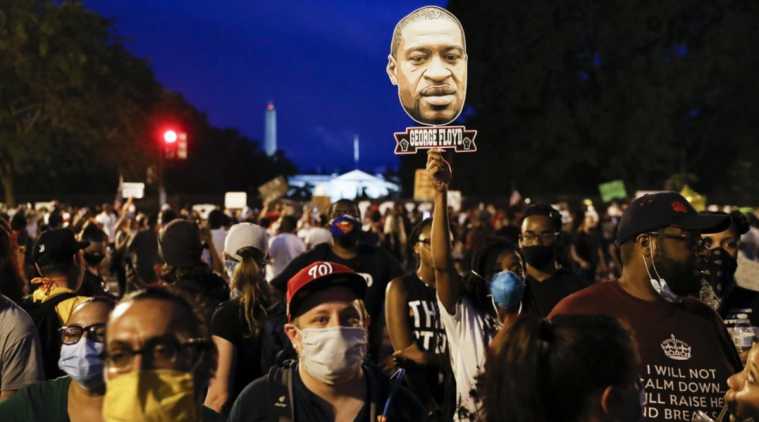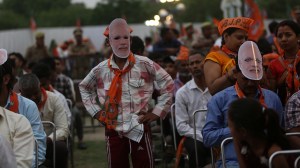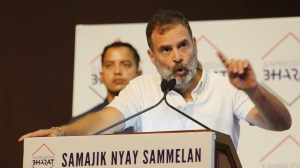- India
- International
As we debate Floyd and systemic prejudice, the power and need for such a moral force couldn’t be more relevant today
Sometimes, it is the moral force that draws attention to it. This moral force helped India win its independence from British brutality.
 Historic nationwide protests have erupted in the USA over the death of George Floyd, a black man who was in police custody in Minneapolis. Floyd died after being restrained by Minneapolis police officers. (AP Photo/Jacquelyn Martin)
Historic nationwide protests have erupted in the USA over the death of George Floyd, a black man who was in police custody in Minneapolis. Floyd died after being restrained by Minneapolis police officers. (AP Photo/Jacquelyn Martin)
The cold-blooded murder of African-American George Floyd on May 25 has sparked a revolution in the United States. Floyd was kneed by a white police official in Minneapolis while his colleague, of Asian origin, stood as abettor. This brutality was recorded on mobile phone cameras by onlookers who protested but to no avail. The video galvanised global communities to demand justice for George Floyd and call for an end to America’s mistreatment of its black and brown citizens by the cruel world of white supremacy and racial capitalism.
The US has reverberated with cries of abolition of racialised policing and there have been calls for defunding the police. Unjust incarceration of black and brown people and a capitalism that preys on the poor and vulnerable of all shades is a template of the American Dream. Malcolm X saw this as an American nightmare for African-Americans.
Big US corporations, global financial industries and liberal educational institutions immediately lent their support to the Black Lives Matter movement. Some courageous ones acknowledged their culpability, with a resolve to correct their past mistakes. In the entertainment industry, white celebrities co-created a video clip accepting their complicities: assuming, overlooking, shutting down or not saying anything on racial bias when it was required.
Back in India, Dalit rights activists Ravi Keerthi (50), Mayuri Keerthi (49) and Bhimrao Kanshiram Keerthi (12) took out a public protest in Nagpur against anti-black racism in America. They pointed to similarities of caste and race discrimination. They chanted “I can’t breathe”, adding to the echoes of Floyd’s final words.
I was busy fielding TV and other media interviews. Everyone, it seemed, was interested in understanding my perspective on the racial question in America. No one, it seemed, was interested to look at obvious parallels. I had to force this analogy into the discussions. One panelist in a TV debate said it was a US-centred conversation and, hence, bringing up caste issues of India would be a diversion.

As usual, Indian celebrities were apathetic. While some woke ones did lend their support, no one seemed interested in acknowledging the oppression of Dalits who have to live through hell under similar and sometimes far brutal circumstances in India. From Sambhal to Moradabad to Pune to Nagpur, be it over practice of religious rituals or a property dispute, couples in love or crimes of hate, there are several examples of Dalits brutalised and killed by upper-caste perpetrators.
This tragedy also underlines the role of police brutality against Dalits, Adivasis and Muslims in India. In many cases, the murder of a Dalit is passed off as “another Dalit murder”. The SC/ST (Prevention of Atrocities) Act is rarely invoked and police crudely discourage any reference to caste atrocities.
Many times, an FIR is not filed. If filed, investigation and due process are delayed. Perhaps, that explains how a Thevar man found guilty in Tamil Nadu of ordering the vicious murder recorded on a CCTV camera of his son-in-law Shankar, a Dalit, was set free by the Madras High Court.
Police, in general, is an anti-Dalit, Adivasi and Muslim institution. Their lack of empathy for victims of these groups indirectly make them co-convicts. This has to do with the way police are trained and taught to respond to cases involving Dalits, Adivasis or Muslims.
Many times, the character of a criminal is assumed. S/he must have a certain name, dress a certain way, worship a particular religion. There are also communalised, casteist elements in the forces that are often not discussed. There is little debate on these aspects of the law enforcement machinery.
Looking at the damning Dalit murders and the cold response from the court and police system, there is need for a renewed society-led response to these atrocities on Dalits. Need for a moral force that is dedicated to fighting the injustice meted out to the poor, vulnerable, weak Dalits. In the face of lawlessness and the lack of State and police interest in curbing atrocities, there has to be a Constitutionally devoted, socially conscious force that keeps violence in check.
Sometimes, it is the moral force that draws attention to it. This moral force helped India win its independence from British brutality. As the world debates Floyd and systemic prejudice and oppression, the power and the need for such a moral force couldn’t be more relevant today.
Suraj Yengde, author of Caste Matters, curates the fortnightly ‘Dalitality’ column
EXPRESS OPINION
Apr 24: Latest News
- 01
- 02
- 03
- 04
- 05










































